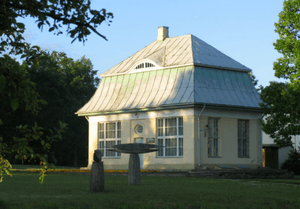Johann Ernst Glück
| Johann Ernst Glück | |
|---|---|
| Born |
10 November 1652 Wettin, |
| Died |
5 May 1705 (aged 52) Moscow, |
| Occupation |
Theologian Translator |

Johann Ernst Glück (Latvian: Ernsts Gliks; 10 November 1652 – 5 May 1705)[1] was a German translator and Lutheran theologian active in Livonia, which is now in Latvia.
Glück was born in Wettin as the son of a pastor. After attending the Latin school of Altenburg, he studied theology, rhetoric, philosophy, geometry, history, geography, and Latin at Wittenberg and Jena.
Glück is known for translating the Bible into Latvian, which he carried out in its entirety in Marienburg (Alūksne) in Livonia, in the building now the Alūksne Museum, established to honour his work. He also founded the first Latvian language schools in Livonia in 1683. He died in Moscow.
He had four daughters, a son (Ernst Gottlieb Glück), and a foster-daughter Marta Skowrońska who married Peter I and is mainly known as Catherine I. From 1725 until 1727 she was empress of Russian Empire.
References
Bibliography
- "Mach dich auf und werde licht - Celies nu, topi gaiss" - Zu Leben und Werk von Ernst Glück (1654-1705). Akten der Tagung anlässlich seines 300. Todestages vom 10. bis 13. Mai 2005 in Halle (Saale). Herausgegeben von Schiller, Christiane / Grudule, Mara. Wiesbaden, Harrasowitz, 2010.